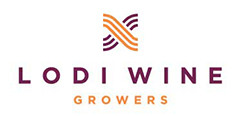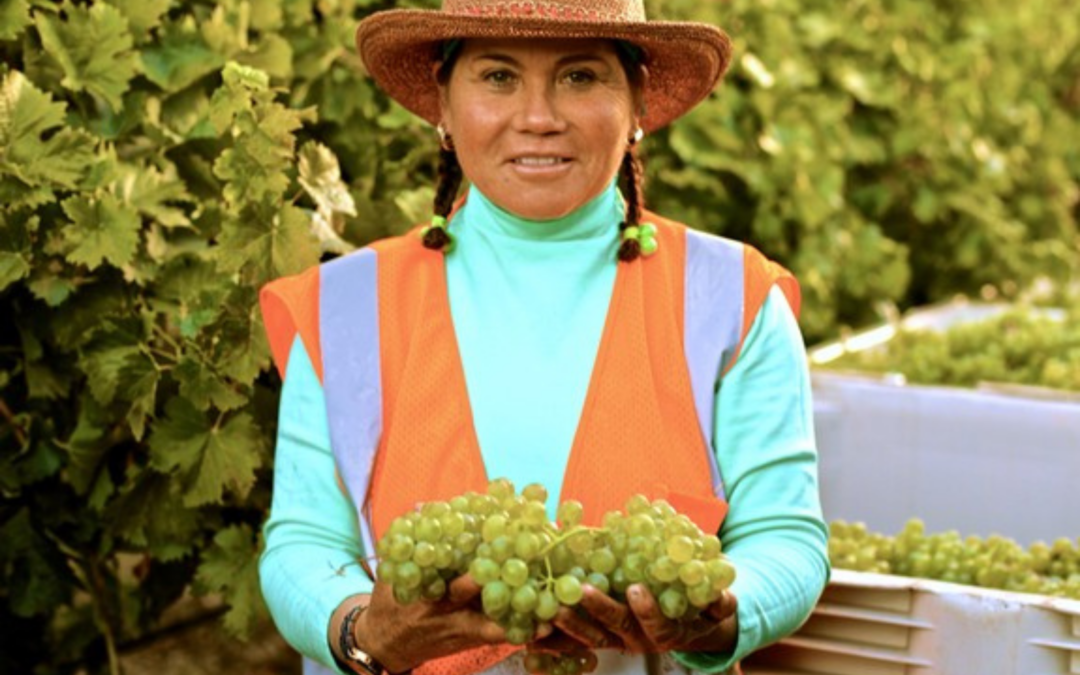MONDAY, MAY 30, 2022. BY RANDY CAPAROSO.
Featured Image: Vino Farms Vineyard Manager, Marisela Granados, with Vermentino from The Bench Vineyard, cultivated both sustainably and biodynamically (two farming systems that are not diametrically opposed) in Lodi’s Clements Hills appellation.
For the longest time, a certified USDA organic seal on a food product has been the signpost sought by consumers who prioritize the health of the environment and themselves. In the market for domestic wines, however, various certified sustainable seals have become the predominant markers for conscientious shoppers to follow. This, evidently, is not sitting well with some industry observers.
There was a recent article, for instance, published by a widely followed industry news service, Wine Industry Network, that brought out the inevitable friction between the various organizations competing for the attention of consumers, grape growers and wineries, and trade and media.
The article was entitled “Navigating the Sustainability Landscape: Which Certifications Matter?” The answer to that question was strongly suggested in the contents of the post: “Beyond the wine industry’s most transparent certifications, which include the CCOF (California Certified Organic Farmers) and USDA organic programs and the Demeter Biodynamic® certification, there is not a single certification governing sustainable winegrowing in the United States that prohibits the use of synthetic herbicides.”
The article cites synthetic applications in vineyards as a litmus test for the validity of environmental responsibility. There is no getting around the fact that the major sustainable programs embraced across the country do allow the use of synthetic herbicides. As pointed out in the article, “Nearly half of American adult drinkers of beverage alcohol (48%) say they are ‘positively influenced’ to buy brands that have demonstrable environmental or sustainability credentials.” While many of these Americans prioritize “recycling, solar power, water, and carbon footprint reductions,” this comes “at the expense of the health of the soil and, in turn, the people who work and live on the land.”
To the author, this amounts to “the success of the wine industry’s obfuscation” of environmental priorities “behind a logo touting sustainability… How has the protection of the ecosystem fallen so far down the list of priorities for consumers defined as those who are the most concerned?”
Good question. Is this another case of big industry pulling the wool over a population’s eyes? Is there a “bad guy” here? Let’s try to look at a slightly fuller picture.
Proponents of sustainable programs, on one side, would say that the use of synthetic fertilizers and pesticides is just one part of the voluminous integrated pest and weed management systems typically falling under the banner of “sustainable.” Widely followed systems associated with third-party certification organizations, such as LODI RULES for Sustainable Winegrowing, consist of as many as over 100 farming practices addressing a full range of concerns involving the health and safety of people, products, and environment.
Dr. Clifford Ohmart, who during the 1990s pioneered the workbooks utilized in most of the sustainable systems adopted by the winegrowing industry today, points out that certifications such as LODI RULES utilize the PEAS model (i.e., Pesticide Environmental Assessment System) for tracking, measuring and managing factors such as pesticide risks. Says Ohmart, ” If one looks at the total number of risk points [calculated by the PEAS model] for a growing season that is allowed under LODI RULES, more than half come from the use of sulfur dust, which is also an organically accepted material, depending on its source.
A little more than half of the California vineyard acreage certified by LODI RULES now falls within the Lodi appellation. Taking advantage of data on pesticide usage that California growers are compelled to file with County Agriculture Commissioner Offices, in 2020 Ohmart compiled a report entitled Lodi Growers Reduce Pesticide Risk. Although only a quarter of Lodi vineyards are actually certified sustainable, the numbers show that since 1999 use of pesticides within the region as a whole has declined by 81%; high-risk pesticides by 89%. During the same time period, the use of herbicides with the potential to leach into groundwater has declined by 62%. The use of sulfur, widely used in conventional, sustainable as well as organic farming, has declined by 23%.
One of the goals of sustainable movements reiterates Ohmart, “is striving to reduce pesticide risk. The reality is that pesticides, both organically approved and conventional, will always play an important role in agriculture. That is because we will always have pests, no matter how natural we try to make our farming.
“The take-home message is all pesticides used in farming — whether organic, Biodynamic or synthetic — have a level of risk associated with their use. Yet so many people who see the terms organic or Biodynamic® think ‘no pesticides.’ This is a huge misconception.”
Addressing that misconception, there was a widely circulated article in Scientific American entitled Mythbusting 101: Organic Farming > Conventional (Wilcox; July 18, 2011) that minced no words about this plain fact about the agricultural industry: “Many large organic farms use pesticides and fungicides liberally.” While certified organic farms may, in fact, routinely spray with pesticides, there are farms that are pesticide-free which, nonetheless, cannot attain organic certification because they might use a synthetic herbicide, maybe, once a year. In a more recent AgDaily post, Top 7 myths about organic farming (Miller; March 15, 2022), it is pointed out that the USDA has approved over 8,000 branded pest-control products, many of those products “very similar to conventional, just with an inert ingredient or two changed.”
There is, as a matter of fact, plenty of research pointing out the fact that while organic farms are generally assumed to use fewer herbicides and pesticides than, say, conventional farms, the metrics do not actually bear this out. In a recent comprehensive study entitled Identifying and characterizing pesticide use on 9,000 fields of organic agriculture (Larsen, Powers, McComb; September 2021), you find tables demonstrating that certified organic vineyards assessed in Kern County have been spraying with more pesticides than conventionally farmed vineyards.
Full disclosure: I live in Lodi, where there is a strong preference for sustainable winegrowing. Then again, there is now a stronger preference for sustainability throughout California and in other states with significant wine industries. In Lodi, there are also numerous growers and winery owners who farm both sustainably as well as organically, rather than just one or the other. There are even some vineyards in Lodi that are certified by Demeter for Biodynamic® farming, on top of qualifying for sustainable certification.

Sustainable and organic certified signs in Bokisch Vineyards’ Terra Alta Vineyard, in Lodi’s Clements Hills appellation.
The Lodi appellation is more of farming rather than a “winery” region, consisting primarily of independent landowners or groups who have invested in vineyards in order to capitalize on the wine market. A handful of the larger growers also own their own wineries, where they are able to process their grapes for the bulk wine market, as well as do a considerable amount of custom winemaking and bottling. Grape growing in Lodi is a business, much like any other in the agricultural industry, and most of this business is geared towards meeting the needs of wineries and their marketing priorities, which may or may not entail organically or sustainably grown grapes.
I recently asked Bokisch Vineyards‘ Markus Bokisch, who sells as well as custom crushes grapes from vineyards that are certified both organically and sustainably, for his perspective on the two approaches.

Bokisch Vineyards’ Markus Bokisch, who farms nearly all his vineyards certified both organic and sustainable.
According to Mr. Bokisch:
I think that our grower community prefers sustainability because it is a more quantifiable approach to farming. Many consumers may prefer “organic” because, frankly, they find that term to be more appealing. My main motivation for farming sustainably is to pass property down to the next generation in a better condition than I inherited it. Improving wine quality, in that sense, might be secondary to sustainability.
If, however, I was to choose just one of the programs, one that would lead to improved farming practices, I would choose sustainability over organic because it is more holistic in its approach to farming, and better addresses our ultimate goal of property stewardship. It is also more difficult to achieve.
LODI RULES, for instance, directly tackle six aspects of sustainability, which include 1) business management, 2) human resource management, 3) ecosystem management, 4) soil management, 5) water management, and finally, 6) pest management.
Furthermore, LODI RULES quantifies the toxicological impact of almost all of the inputs used in farming through its Pesticide Risk Model. If you fail any one of these chapters, you are de-certified. This is a high bar to meet, and it requires a lot of documentation and time.

The Lucas Winery’s Heather Pyle Lucas (center), discusses her combination of organic and sustainable farming with visiting sommeliers in her family’s ZinStar Vineyard (Zinfandel planted in 1933).
Unlike Bokisch Vineyards, Lodi’s The Lucas Winery is not in the business of supplying grapes to other wineries. All of their fruit goes into their own estate-grown wines. For nearly its entire existence (the winery was founded in 1978), the Lucas family’s vineyards have been certified organic by CCOF. In recent years, to meet expanded goals, they have also been farming sustainably.
In the past, co-owner/winemaker Heather Pyle Lucas has been diplomatic when comparing organic and sustainable programs. But in a recent, more candid, moment, she made these observations:
The goals of organics and sustainability are equally important to us. Since I work with both CCOF and LODI RULES regarding compliance, I just don’t see how one is more transparent than the other. Since we get asked about the differences all the time, though, I know there are a lot of misconceptions, and misinformation is rampant.
But if you think organic compliance is the more environmentally responsible or difficult approach, I would suggest that you ride along with an auditor for LODI RULES one day and see how complex this program really is, and the level of commitment it takes a grower to achieve this certification.
A good sustainable program does, in fact, focus on multiple facets towards improving the Environment, with a capital E, which includes workers, business profitability, emissions, water conservation, etc. It excels in many areas at once with clear, concise metrics that demonstrate the program’s values (it’s okay to do X but even better to do Y or Z). I personally learned a tremendous amount just by applying the point scores in another grower’s operation. It’s important that the evaluation/point system sends a clear message to growers as to what is considered to be the most important goals, and to consider changing if possible.
At the same time, one of the compelling aspects of a good sustainable program is that it also has a low yet broad bar, or barrier, for entry. This makes it inclusive, which brings about a broader base of growers focused on what practices are most detrimental and what practices are “sustainable.” It’s a system that invites participation but encourages constant improvement.
I would say, though, that you can’t judge a system based only on the use of one thing, such as Roundup®, even with all the brouhaha surrounding glyphosate. I agree we should get away from it. But sustainable programs, while allowing it, also rewards allowing weeds. Weed control is a problem, but less so than what we use to achieve it. Beneficial organisms don’t care how weeds are removed, they just don’t find a habitat inland devoid of grasses and other weeds.
If you want to poke holes in sustainable programs, you would have to throw the net over organics, too, especially in its reliance on sulfur dust — its biggest flaw being, as a generalist pesticide like many others, it knocks back both good and bad organisms.
On the balance, you have to say that it’s sustainable programs that are more holistic, and certainly much more comprehensive. Organic farming is more rote, and not nearly as transparent as you may think. When inspectors come and we ask about movements towards things like wildlife corridors or hedgerows for beneficial insects, we draw a big blank. CCOF may have guidelines for that, but they are very broad and not particularly well enforced.
And besides, the USDA’s entire National Organic Program structure, which rewards the companies that put in the big money in order to get on the list of allowed herbicides and pesticides, has a distinct air of clubbiness, not entirely savory. It’s clear enough to me which practices have a more positive environmental impact, and it’s not organics.

Lodi Winegrape Commission’s Dr. Stephanie Bolton in Bechthold Vineyard, a 25-acre ancient vine growth (Cinsaut planted in 1886) that is farmed both sustainably and organically to meet specific needs of winery/clients.
Dr. Stephanie Bolton, who serves as Lodi Winegrape Commission‘s director of grower education and sustainable winegrowing, adds these final words to the conversation:
I think it’s good to be critical of certifications. Anyone can find fault in organic or sustainable systems. But picking apart the various programs probably just adds to any distrust or confusion, especially among consumers. No program will ever be perfect, but they can be better.
Getting away from the worldwide over-use of synthetic herbicides, for one thing, is a great goal to have. We happen to be planning an upcoming weed outreach meeting. For this we are creating visual life cycle diagrams, illustrated by an artist, listing the top ten troublesome weeds in vineyards so that the growers can clearly recognize them when they go to seed. I plan to play a game to identify these weeds out in a vineyard. We’ll also show some new and old non-chemical technologies for weed management, and talk about the acceptance of some weeds on a vineyard floor.
It’s easy to wrap your mind around just one or two aspects of any comprehensive farming system that you might find objectionable. The reality is that none of us will ever fully understand all of the implications of what we do to the environment and to people, especially on a global scale. Our lens simply isn’t wide enough. It’s more important, I think, to take actions that move the needle in the right direction.
Randy Caparoso is a full-time wine journalist who lives in Lodi, California. Randy puts bread (and wine) on the table as the Editor-at-Large and Bottom Line columnist for The SOMM Journal, and currently blogs and does social media for Lodi Winegrape Commission’s lodiwine.com. He also contributes editorial to The Tasting Panel magazine, crafts authentic wine country experiences for sommeliers and media, and is the author of the new book “Lodi! A definitive Guide and History of America’s Largest Winegrowing Region.”
Have something interesting to say? Consider writing a guest blog article!
To subscribe to the Coffee Shop Blog, send an email to stephanie@lodiwine.com with the subject “blog subscribe.”
To join the Lodi Growers email list, send an email to stephanie@lodiwine.com with the subject “grower email subscribe.”
To receive Lodi Grower news and event promotions by mail, send your contact information to stephanie@lodiwine.com or call 209.367.4727.
For more information on the wines of Lodi, visit the Lodi Winegrape Commission’s consumer website, lodiwine.com.
For more information on the LODI RULES Sustainable Winegrowing Program, visit lodigrowers.com/standards or lodirules.org.









